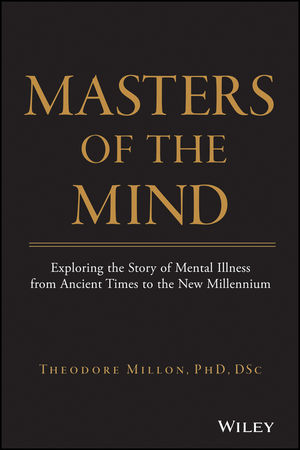Masters of the Mind: Exploring the Story of Mental Illness from Ancient Times to the New MillenniumISBN: 978-0-471-46985-8
Hardcover
672 pages
August 2004
 This is a Print-on-Demand title. It will be printed specifically to fill your order. Please allow an additional 10-15 days delivery time. The book is not returnable.
|
||||||
Sweeping in scope and truly impressive in its scholarship, Millon’s text traces historical developments and identifies the thinkers and scientists who from antiquity to the present time have shaped contemporary understanding of how the mind works. This captivating and informative volume will be appreciated and valued by all readers interested in the history of ideas. —Irving B. Weiner, Ph.D. (University of South Florida)
Wide ranging, cohesive and imminently readable, Theodore Millon’s Masters of the Mind is a tour de force from one of the world’s leading psychologists....a major touchstone for all those interested in these fascinating stories of mental disorders and the search for systems to understand and treat [them]. —Jeffrey J. Magnavita, Ph.D. (Connecticut Center for Short-Term Dynamic Psychotherapy)
A fascinating, informative, comprehensive, broad-minded, brilliant and perceptive tour of the universe of views of mental function and dysfunction, this book helps the reader understand contributions from nearly every conceivably relevant discipline throughout history. Himself, a long time advocate and practitioner of creative and integrative theory supported by data (as well as measurement techniques designed to generate such data), Millon provides enlightening commentary at the end of each chapter as well as in an epilogue at the end of the book. After reviewing a breathtaking array of perspectives, he offers a simple but profound suggestion for how to put it together. "Intrinsic unity cannot be invented.. by arbitrary efforts to synthesize disparate and disjunctive theoretical schemas... The natural sythesis.. inheres within patients themselves." In this wisdom, he urges all of us - clinicians, theorists and researchers alike – to stay close to the data offered ! by real persons- whole human beings seen in the broad array of contexts marked by Millon in this amazing and wonderful book I shall ask that all of my trainees read and re-read it, whether they are still in professional schools, or returning for continuing education. — Lorna Smith Benjamin, Ph.D.(University of Utah)



